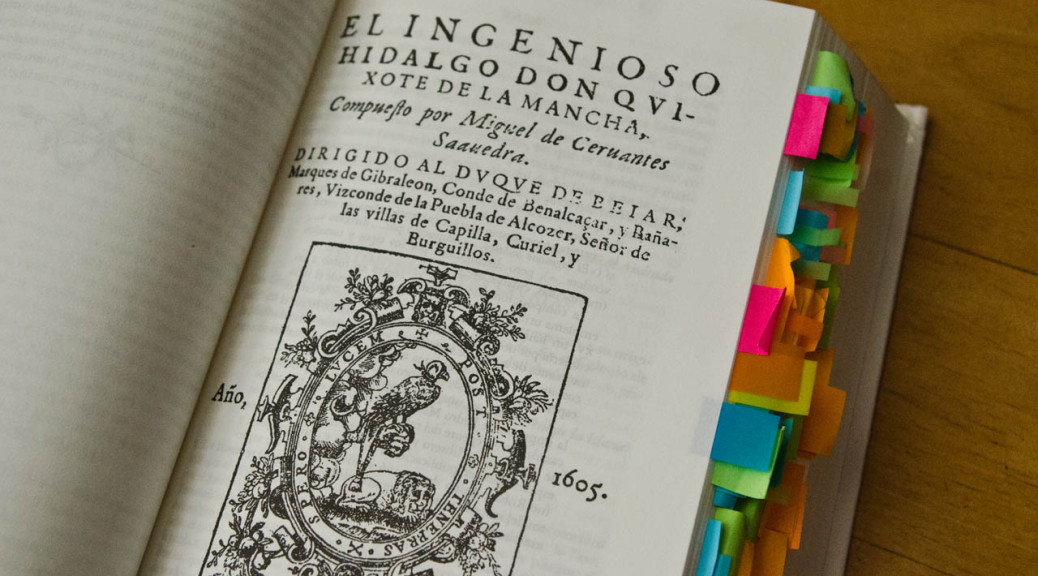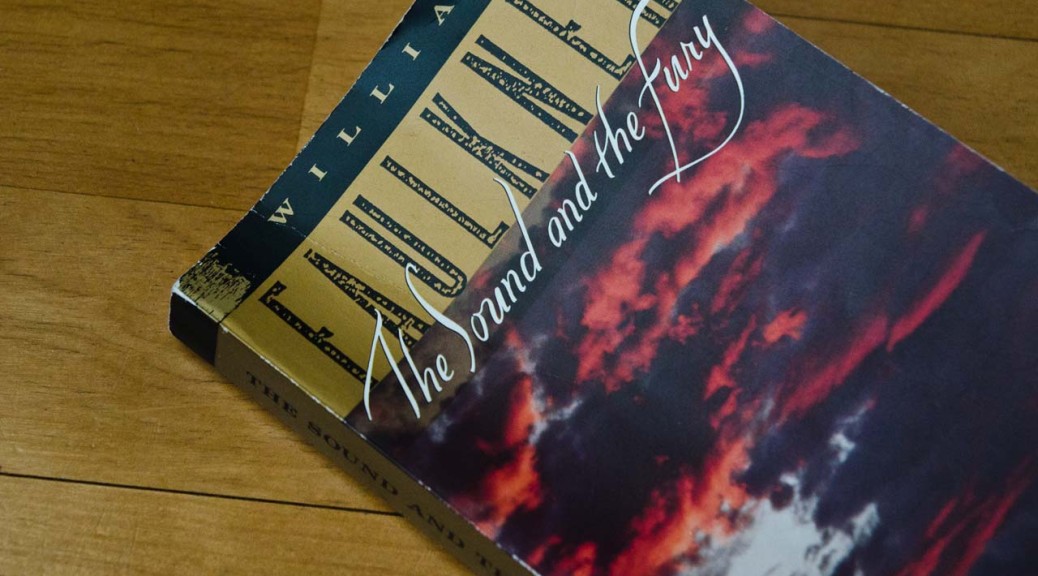Cervantes Saavedra, Miguel de. Don Quijote De La Mancha: Edición Conmemorativa IV Centenario Cervantes. Madrid: Real Academia Española, 2015. Print. (First ed. 1605)
Siglo de Oro
“Salieron para America cientos de ejemplares de la novela… Lo que no había conseguido Cervantes, lo lograba su criatura asentándose en el Nuevo Mundo.” (México -> Cartagena de Indias -> Portobelo, Panamá -> El Callao) p. xi
To Watch Дон Кихот Don Quixote (1957) Grigori Kozintsev.
José Ortega y Gasset Meditaciones del Quijote “su eje central es precisamente el diálogo,” p. xxi See “Yo soy yo y mi circunstancia”
“complejidad del sistema novelístico de Cervantes y sus estrategias para casar versímilmente su fábula mentirosa con la inteligencia de sus lectores están poderosamente condicionadas por la encrucijada en la que, como también Shakespeare y todos sus contemporáneos, se encuentra: la del solapamineto de la la galaxia Gutenberg con la pervivencia, muy vívida todavía, de formas de coexistencia y comunicaión arcaicas en las que sigue muy arraigada la oralidad.” p. p xxii
Quijote “Llegado, por el contrario, a Barcelona, ve en una imprenta cómo se corrigen las pruebas de una nueva edición de Quijote de Avellaneda, y ello le da pie para denostarlo.” p. xxiv
Olfato y tacto en Don Quijote p. xxvii

Primera edición conocida de Amadís de Gaula de Garci Rodríguez de Montalvo, impresa en Zaragoza por Jorge Coci, 1508. Via Wikimedia.

Portada de Los cinco libros del esforzado e invencible caballero Tirante el Blanco, primera traducción al castellano de Tirant lo Blanc, impresa por Diego de Gumiel. Via Wikimedia.
Tirante el Blanco
Tristán de Leonís
“Al final, termina por salirse con la suya. La ficción va contaminando lo vivido y la realidad se va gradualmente plegando a las excentricidades y fantasías de don Quijote. p. XXXV (Mario Vargas Llosa, Una novela para el siglo XXI)
“Los amigos del pueblo de don Quijote, tan adversos a las novelerías literarias que hacen una quema inquisitorial de su biblioteca, con el pretexto de curar a Alonso Quijano de su locura recurren a la ficción: urden y protagonizan representaciones para devolver al Caballero de la Triste Figura a la cordura y al mundo real. Pero, en verdad, consiguen lo contrario: que la ficción comience a devorar la realidad.” p. XXXVI (Mario Vargas Llosa, Una novela para el siglo XXI)
Ruta de Don Quijote
“El Quijote no cree que la justicia, el orden social, el progreso, sean funciones de la autoridad, sino obra del quehacer de individuos que, como sus modelos, los caballeros andantes, y él mismo, se hayan echado sobre los hombros la tarea que hacer menos injusto y más libre próspero el mundo en el que viven.” p. XL (Mario Vargas Llosa, Una novela para el siglo XXI)
“la Santa Hermandad, cuerpo de justicia en el mundo rural, de la que se tiene anuncios durante las correrías de don Quijote y Sancho, son mencionadas más bien como algo lejano, oscuro y peligroso.” p. XL
“España aparace como un espacio muchi más vasto, cohesionado en su diversidad geográfica y cultural y de unas inciertas fronteras que parecen definirse en función no de territorios y demarcaciones administrativas, sino religiosas: España termina en aquellos límites vagos, y concretamente marinos, donde comienzan los dominios del moro, el enemigo religioso.” p. XLII
“como ocurre con las obras maestras paradigmáticas… al igual que el Hamlet, o La divina comedia, o la Ilíada y la Odisea, ella evoluciona con el paso del tiempo y se recrea a sí misma en función de las estéticas y los valores que cada cultura privilegia, revelendo que es una verdadera caverna de Alí Babá, cuyos tesoros nunca se extienguen.” p. XLIII-XVLIV
To Read
Rayuela by Cortazar,
In Search of Lost Time by Marcel Proust
“Aprovechando lo que era un tópico de la novela de caballerías (muchas de ellas eran supuestos manuscritos encontrados en sitios exóticos y estrafalarios), Cervantes hizo de Cide Hamete Benengeli un dispositivo que introducía la ambigüedad y el juego como rasgos centrales de la estructura narrativa.” p. XLIV
—
Canto de Calíope en La Galatea
“Cervantes, que se vio imposibilitado de hacer efectivas las sumas recogidas, fue internado en la cárcel de Sevilla, donde pasó unos tres meses del año 1597.” p. LXX (Martín de Riquer, Cervantes y el “Quijote”)
“En 1613 aparecen las Novelas ejemplares; en 1614 el Viaje del Parnaso; en 1615 la Segunda parte del Quijote y las COmedia y entremeses; y en 1617, póstumamente, el Persiles y Sigismunda. O sea que la gran época de aparición de las obras de Cervantes, presciendiendo de la Primera parte del Quijote, corresponder a la etapa que va de los 66 a los 68 años del escritor.” p. LXXI (Martín de Riquer, Cervantes y el “Quijote”)
“Aunque Cervantes ha escrito estos versos en tono humurístico, no deja de haber en ellos cierta amargura de quien, sabiéndose un gran prosista, comprende que no puede compararse con los grandes poetas de su tiempo.” p. LXXIII (Martín de Riquer, Cervantes y el “Quijote”)
“Fue enterrado en el convento de las Trinitarias Descalzas de la calle de Cantarranas (hoy Lope de Vega), donde sin duda esposan todavía sys restos sin que haya posibilidad de identificarlos.” p. LXXVIII (Martín de Riquer, Cervantes y el “Quijote”)
“En el Quijote Cervantes recoge la experiencia de los recuerdos de su vida; en el Persiles recoge el fruto de sis lecturas de libros.” p. LXXIX (Martín de Riquer, Cervantes y el “Quijote”)
“El “caballero andante” existió, y todavía erraba por los caminos de Europa y de corte en corte en demanda de aventuras (justas, pasos de armas, torneos, batallas a todo trance) un siglo antes de que Cervantes se pusiera a escribir el Quijote. Y alrededor de estos caballeros existió una literatura que puede distribuirse en dos categorías: la biografía del caballero y la novela caballeresca. Como ejemplos de la primera categoría tenemos el Livre des faits du bon messire Jean le Maingre, dit Bouciquaut, el Livre des faits de Jacques de Lalaing y el Victorial, o biografía de don Pero Niño, y podriamos añadir el Libro del Passo Honroso… A la segunda categoría pertenecen determinadas novelas … Las catalanas Curial e Güelfa y Tirant lo Blanch y las francesas Jean de Saintré y el Roman de Jean de Paris… Basta señalar que la biografía de un caballero perfectamente histórico como fue Jacques de Lalaing, que realizó sus primeras hazañas en Vallodolid, ofrece gran similitud con la novela que tiene por protagonista al ficticio Jean de Saintré.. Este tipo de novelas a las que conviene dar el nombre de “novelas caballescas” en clara oposición a los “libros de caballerías”, fue comprendido por Cervantes, como atestigua su elogio del Tirant lo Blanch” p. LXXXIV (Martín de Riquer, Cervantes y el “Quijote”)
“El Quijote no es, como creyeron algunos románticos, una burla del heroísmo y del idealismo noble, sino la burla de unos libros que, por sus extremosas exageraciones y su falta de mesura, ridiculizaban lo heroico y lo ideal.” p. LXXXV (Martín de Riquer, Cervantes y el “Quijote”)
“Da la impresión que Certantes escribía sin leer su labor.” p. LXXXVIII (Martín de Riquer, Cervantes y el “Quijote”)
“Cervantes, cuando escribe la Segunda parte de la novela, tiene ya sesenta y ocho años, está en la miseria, ha padecido desdichas de toda suerte en la guerra y en el cautiverio, el honor de su hogar no ha sido siempre limpio ni ejemplar, ha recibido humillaciones y burlas en el cruel ambiente literario; y a pesar de todo ello, por encima de sus angustias, de sus estrecheces y de sus penas, el buen humor y el agudo donaire inundan las páginas del Quijote. p. XCIII (Martín de Riquer, Cervantes y el “Quijote”)
“la más desdichada de tales transposiciones fue que la supresión de unas páginas en que se narraba cómo Sancho Panza perdió a si jumento no llevó aneja la eliminación de la referencias al escudero montado en el asno” p. CII (Francisco Rico, Nota al texto)
“endecasílabo) El ingenioso hidalgo de la Mancha.” p. CIV (Francisco Rico, Nota al texto)
“Téngase en cuenta que los libros se ponían entonces a la venta “en papel”, es decir, como un conjunto de pliegos sin encuadernar, y así serían los Quijotes que Cervantes tuviera a mano a principios de 1605.” p. CXI (Francisco Rico, Nota al texto)
“Tras un corto período de gran éxito, la novela sufre un eclipse desde 167 hasta que la devuelve al mercado la edición de Madrid, 1636-1637, cuatro o conco veces reimpresa en la Corte en los decenios siguientes,” p. CXII (Francisco Rico, Nota al texto)
“vacilaciones presentes en los escritos de puño y letra de Cervantes.” mesmo~mismo, cuasi~casi, fee~fe, escrebir~escribir invidia~envidia, sospiro~suspiro, asconder~esconder, húmido~húmedo, imágines~imágenes, proprio~propio, recebir~recibir, esaminador~examinador, eceto~exepto, agora~ahora, ansí~así, güésped~huésped, deste~de este, della~de ella. CXV-CXVI (Francisco Rico, Nota al texto)




